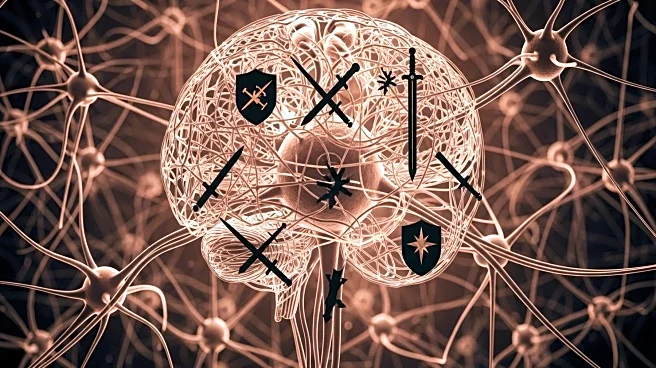What is the story about?
What's Happening?
Neuroscientist Nicholas Wright has released a book titled 'Warhead,' which delves into the neuroscience behind warfare and its influence on human decision-making. Wright, who has advised the US Pentagon Joint Staff for over a decade, provides insights into how the human brain processes conflict and the implications for international confrontations. The book examines the role of various brain parts, such as the cerebellum and brainstem, in driving survival instincts and influencing decisions during conflicts. Wright argues that historical experiences of war have shaped human evolution and decision-making processes, citing examples from World War I and II. He discusses how prediction errors and risk thresholds can impact the outcomes of conflicts, emphasizing the importance of understanding these cognitive processes in the context of modern warfare, which increasingly involves military technology and artificial intelligence.
Why It's Important?
The insights provided by Wright's book are significant as they offer a deeper understanding of the cognitive processes that influence decision-making in warfare. This knowledge is crucial for policymakers, military strategists, and leaders who navigate international conflicts. As warfare evolves with advancements in technology and artificial intelligence, understanding the human brain's role in conflict resolution becomes increasingly important. Wright's research highlights the need for wisdom, self-knowledge, and emotional regulation among leaders, qualities that are essential for effective decision-making in high-stakes situations. The book challenges the notion of war as an inevitable outcome, urging a more nuanced approach to conflict management that considers the psychological and neuroscientific aspects of human behavior.
What's Next?
Wright's book may prompt further discussions and research into the neuroscience of warfare, potentially influencing military training and strategy development. As leaders and policymakers seek to understand the cognitive underpinnings of conflict, there may be increased interest in integrating neuroscientific insights into diplomatic and military decision-making processes. The book could also inspire initiatives aimed at fostering emotional regulation and self-awareness among leaders, contributing to more effective conflict resolution strategies. Additionally, as warfare continues to be shaped by technology, there may be a push to explore how artificial intelligence can be used to complement human decision-making in military contexts.
Beyond the Headlines
The exploration of warfare through a neuroscientific lens raises ethical questions about the role of human cognition in conflict. Wright's book challenges readers to consider the inevitability of war and the potential for cognitive biases to escalate conflicts. It also highlights the importance of developing strategies that account for human psychological limitations and the need for emotional intelligence in leadership. As wars are increasingly fought at a distance, the book underscores the importance of understanding the human elements that drive conflict, offering a unique perspective on the intersection of neuroscience, technology, and international relations.
















